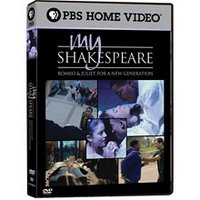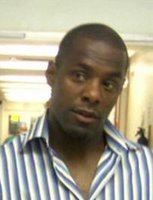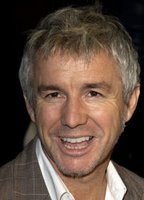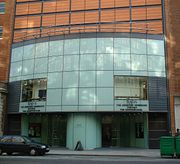Anyone for Shakespeare?
 Last night I watched the DVD of My Shakespeare. Kate and her husband sent it to my husband, who teaches Shakespeare, as inspiration (as if he needed any).
Last night I watched the DVD of My Shakespeare. Kate and her husband sent it to my husband, who teaches Shakespeare, as inspiration (as if he needed any).He was busy grading papers, so I watched it instead. It was brilliant. It spoke to me both as a writer and as a former teacher. It spoke to me as a parent and as a playgoer. I was captivated in a way that I never expected to be captivated at all.

It is a documentary about how Paterson Joseph, a British actor from, shall we say, one of the less-likely places to turn out Shakespearean thespians, decided he wanted to go back to Harlesden, from whence he'd come, and challenge a group of non-actors to put on a production of Romeo and Juliet at the Royal Academy of Dramatic Art.
He definitely had his work cut out for him. If his actors had never acted before, he'd never directed before! It was a learning experience for both of them. He had as his mentor, Australian director, Baz Luhrmann, whose commentary and exhortations make up a part of the story and give both Pat
 erson and the viewers a sense of direction.
erson and the viewers a sense of direction.The documentary is an amazing piece of work. I was, literally, on the edge of my seat by the time the actors got to RADA to put on their production. I was as nervous as they were -- at least it felt th
 at way. And having watched them develop from doubtful, wary, shuttered individuals to a group who worked together, who gave of themselves, who learned not just their lines and how to deliver them, but to understand the message, and to allow it to come to life through them, I was almost cheering by the end!
at way. And having watched them develop from doubtful, wary, shuttered individuals to a group who worked together, who gave of themselves, who learned not just their lines and how to deliver them, but to understand the message, and to allow it to come to life through them, I was almost cheering by the end!As soon as it was over, I wanted to sit through it again. I watched the first half hour over and then, reluctantly, turned it off to go to bed. But I will watch it again this weekend. And I will probably watch it again after that.
It spoke to me as a writer because I understood, watching Paterson teaching his actors what they needed to do, that motivation is The Most Important Thing in story. If I, as a writer, don't understand what motivates my characters, no one else will either. I won't be able to bring them to life. That's exactly what Paterson told his actors. Get inside them, he said. Know them. If you know what they want, you will be able to do the scene even if you forget your lines.
Amen. It's the same with writing. It stalls if I don't know what my characters want, if I can't get inside them and feel their desires and needs as deeply as they do. If I can, I can almost channel their story.
As a former teacher, I could see -- and appreciate -- Paterson creating an atmosphere where there were great expectations. He couldn't make his actors open themselves up to the roles they'd been given. But he could give them every opportunity to do so. He could challenge and exhort and demand. And he did. And he was able to let go of anyone who wasn't as committed as everyone else. It wasn't about making them feel good about themselves. It was about them putting on a play -- and ultimately being successful (and feeling good about themselves) because they'd done it. They'd exceeded their own expectations. And it was a heady experience.
As a parent, I thought how much like a directing parenting is. You have a concept, a goal, values, all that good stuff. And you do your best to bring out the best in your kids. But you can't do it for them. And you can't be their buddy. You have to focus on something bigger than that. And then, when they've succeeded, well, you are their friend because you helped them make it possible.
And as a play
 goer, I've never felt so involved. The prof and I had a discussion after we went to see Twelfth Night in Stratford last year about how "into" theatre we get. He really does. He is THERE. It is Real and Happening for him. I see a stage, a proscenium, actors. I'm never caught up in it. I'm more caught up in film than he is. It's a medium that works for me.
goer, I've never felt so involved. The prof and I had a discussion after we went to see Twelfth Night in Stratford last year about how "into" theatre we get. He really does. He is THERE. It is Real and Happening for him. I see a stage, a proscenium, actors. I'm never caught up in it. I'm more caught up in film than he is. It's a medium that works for me.My Shakespeare was the best of both worlds. It was film, so I was caught. But it was stage in a way that I have never been caught up before. It was immediate and powerful and, well, simply amazing.
And I was sorry it was so late when we finished. I was inspired to get back to Flynn and Sara and dig deeper.




2 Comments:
I was watching a program on tv about the different movies made based on Shakespeare's books and how some of them have moderized over the years to appeal to younger audiences like Romeo and Juliet.
Hi Christa!
I think that's the great gift of Shakespeare -- that he is so good his work can translate into all ages and types of productions. It speaks to everyone from the Queen of England to the lowliest peasant in all times. If you want a demonstration, check out this dvd. Truly, it's amazing.
Post a Comment
<< Home